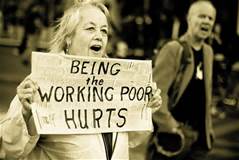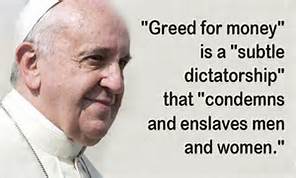“An unfettered pursuit
of money rules. That is
the dung of the devil.”
Pope Francis
The Pope doesn’t care much for greed.
The wages of 30 million U.S. workers cause so much misery they leave within a year. The Economist states this chaos continues because, “The most obvious incentive—more money—is often the last to be considered.”
Often, the issue is greed.
Retail and fast-food businesses also stiff taxpayers. Walmart pays ‘low, low’ wages to impoverished employees: Forbes reports taxpayer assistance totals about $6.2 billion annually.
James Parrott, the Fiscal Policy Institute’s Chief Economist, states, “Wages are so low that 60% of fast-food workers qualify for public assistance.”
What to do? Purdue University’s study concluded that doubling Indiana’s fast-food workers’ wages to $15 an hour would raise prices only 4.3 percent. A $3.99 hamburger would increase 18 cents.
This increase is slight because employee turnover is significantly reduced: Recruiting and training costs decrease; worker morale and productivity improves. With current turnover greater than 100 percent, retail and fast-food industries, on average, lose all employees every year.
This can change. Seattle restaurant owner Jeremy Price says of paying $15 an hour, “It has been a positive change for our staff and our business.”
A living wage is a win/win/win: Employees receive a just wage; employers overcome high turnover and reduced productivity; and taxpayers avoid paying ‘corporate welfare’ for low-wage workers.
The primary problem is greed.
The wealthy counter with the myth: “The rich are makers, the poor are takers.” The reverse is true.
First, lobbyists write laws giving corporate welfare for ‘the takers.’ According to the conservative InvestmentWatch, their loopholes and looting are so brazen that, in 1950, corporations paid $3.00 for every dollar paid by workers; corporations now pay 22 cents.
Second, corporations have stashed $2.1 trillion overseas. This ‘takers’ tax scheme, according to the nonpartisan New America Foundation, eliminated 1.3 million to 2.5 million jobs through 2011.
Third, aristocrats’ paltry effective tax rate on inheritance is 17 percent. The wealthy pay only 20 percent on capital gains.
Fourth, it bears repeating: Taxpayers bankroll corporate profits. New York Governor Andrew Cuomo is livid, “It costs this state $700 million a year to subsidize the profits at McDonald’s and Burger King—and that is wrong, and that must stop.” UC-Berkeley estimates public subsidies for corporations’ low wages totals $153 billion.
The greedy rich are takers. Justice requires they pay their fair share—in taxes and wages.
Fifth, this myth states government rewards poor people who avoid work. Actually, nearly 90 percent receiving benefits are working or disabled. The rest have job training or must find work to avoid losing their safety net. All laborers, ‘the makers,’ should be paid wages which escape poverty.
Sixth, poor workers pay significant taxes: Sales taxes; Social Security; other taxes on wages; and property taxes—directly, or indirectly through rent.
Seventh, by spending all their pay, the working poor create demand for more products and services. This demand ‘ripples’ from one business to the next, multiplying business spending. Thus, living wages spur economic growth—and poor workers’ increased spending creates jobs.
Eighth, the system cheats workers. Laborers’ wages kept pace with productivity from 1948 to 1975. Since then, productivity increased 100 percent—but wages for ‘the makers,’ adjusted for inflation, declined seven percent.
The working poor are makers. Justice requires they are paid their fair share.
Wage slavery requires abolition. The ‘Fight for $15’ movement is right: The minimum wage must become a living wage.
Barriers to wage justice include ignorance and fear, but the main obstacle is greed, “The dung of the devil.”
Absent government action, businesses can still win—achieving low turnover and high productivity—by paying substantial annual increases until $15 is achieved. In this season of wonderment and thankfulness, businesses must act with courage and caring to restore dignity and decency.
Rev. Harry Rix has 60 articles on spirituality and ethics, stunning photos and 1200 quotations for reflection available at www.quoflections.org. ©2015 Harry Rix. All rights reserved.





